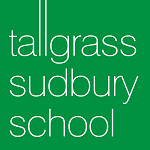When I tell someone what I do, sometimes I get a variation on this question: “Is it for troubled kids?” “You mean like daycare?” “Are they...special?”
The answer is no. At least, not in the way you might think.
While not meant as an insult, the implication behind this question is problematic: that adults would give children freedom only as a last resort, when we’ve “given up” on them.
Let’s get one thing straight: being a student at a Sudbury school, or pursuing any form of self-directed education, is hard. Our schools are sometimes described as “do what you want” schools. Yes, students can choose how to spend their time. But that phrase leaves out two very important things.
First, you’re “doing what you want” within a community, which has set up rules--a lot of rules, some of which are stricter than the ones you’ll find at public school. Rules like “no hurtful language” are written down, can be enforced by anyone in the community, and are taken seriously. Beyond the rules, you’re accountable to the people around you. If you want friends, you need to treat people decently, because no one has to spend time with you. And as a small, community-based school, we run the school together. If the cleaning system isn’t working and the school is a mess, everyone has a part in figuring out a solution. Don’t underestimate the common sense and brilliant innovations that can come from kids of 5, 12, or 17.
Second, figuring out “what you want” and then pursuing it is often very hard. It takes a lot of effort, and it takes a lot of time. The kids at Sudbury schools don’t follow a conventional curriculum, but they have the same goals and dreams that other kids do. They have dreams for right now (I want people to come to my sleepover, I want to earn enough money for a cell phone bill, I want to know how much time there is until JC) and for the future (I want to have four kids, I want to be an architect, I want to support myself just enough that I can spend the rest of my time reading philosophy). Like all of us, including adults, often they don’t quite know what they want, and are stumbling through trying different things, talking to different people, and getting a tiny bit closer, step by painful step.
It’s true that many students first come to us after bad experiences elsewhere. They may think they have failed. We don’t. We see the many ways they have been failed by public school: the schedules that made it impossible for them to use the bathroom when they needed to, the bully they couldn’t get away from, the times they had to sit in seats when they needed to move and be quiet when they needed to learn how to talk to people. Their “failure” is being human, and having needs that don’t match up exactly with the needs of an often dehumanizing institution.
The parents that come to us are sometimes desperate, but they haven’t given up on their children, either. They tell us “She used to be so curious, and now she isn’t interested in anything,” or “We spend all our time fighting about homework,” or “I’m not going to force him to go to school.” If we sense that someone wants us to “fix” who their child is (get them to shape up) or that they consider their child “a failure,” we run the other way.
Academically, too, our kids run the gamut. Some students were excelling in honors classes and others were labeled as “dumb.”
Sudbury schools don’t fix kids. They are already who they need to be. Our job is to support them, help them find resources and develop skills to pursue their goals, and often to sit with them as they work through years of school-related trauma.
We are not trying to reform them so they can be successful in a conventional school system. We want our students to be successful in the real world: to have satisfying relationships, get jobs, learn new skills, contribute to their communities, and, ultimately, enjoy life.
We don’t give them freedom because we’ve given up on them. We give them freedom because we believe in them, and because freedom is a human right.

